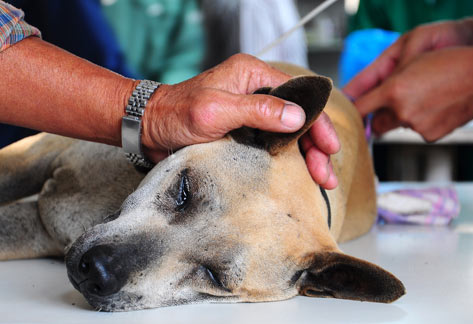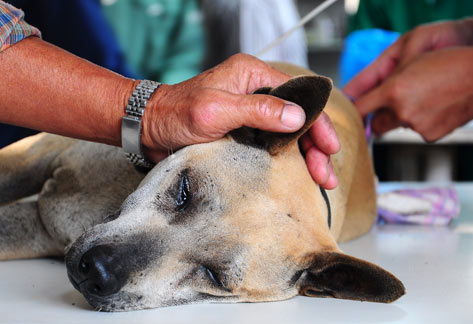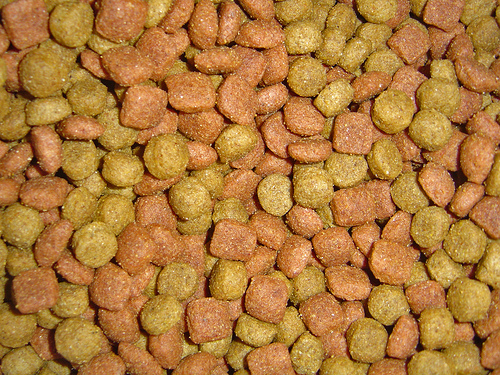


Exocrine pancreatic insufficiency (EPI) is a condition in which an animal’s body can’t produce enough digestive enzymes to properly break down food. Because the food isn’t broken down, the animal is unable to absorb the nutrients, and it passes through the body undigested. This is why the disease is sometimes called maldigestion syndrome.
The affected cat or dog is essentially starving to death, even though he or she is eating voraciously. The animal will pass foul-smelling, loose, light-colored stools and lose weight rapidly. The stool may sometimes contain blood in cats with EPI. The body deteriorates rapidly (atrophy) and the haircoat becomes dull and thin.
The reason the animal is unable to produce the necessary digestive enzymes is due to a malfunction of the pancreas. This small organ is responsible for producing and storing important enzymes that are responsible for breaking down protein, starch, and fats in the food the animal eats. If the food is not broken down and made available for absorption, the animal cannot get the nutrients it needs to survive.
There are several potential causes of damage to the pancreas, such as cancer, an infection, or an inherited condition that causes the pancreas to start shutting down cells at an early age. This genetic condition is most commonly seen in German Shepherd dogs. Cats can also be affected by EPI, but not as commonly as dogs.
The condition is diagnosed through blood and fecal tests for levels of specific digestive enzymes. Clinical signs are very strong indicators of this disease and will help your veterinarian make a diagnosis. It is thought that a major amount of the pancreas (90%) needs to be damaged before signs will even begin to develop in an animal.
Dogs and cats with this condition will require treatment for life. Oral supplementation of the diet with enzyme replacements is a large part of the treatment. Once a proper diagnosis is made and enzyme supplementation begins, your pet should begin to improve rapidly.
Finding the proper dosage of enzyme replacement will take time, and the amount given with every meal can be decreased slowly until the minimum amount needed to maintain control is figured out. The most effective form of enzyme supplementation is a powdered product, but tablets are also available.
Powders are usually mixed in with the food, while tablets are given 30 minutes prior to a meal. Powders should be well-mixed with the food and moistened with water. Allowing the enzyme replacement to “incubate” for a few minutes prior to feeding is recommended. Replacement products are available by veterinary prescription only and can be quite expensive.
The source of most veterinary enzyme replacement products is ground-up, freeze-dried pancreatic tissue from a cow or hog. The pancreatic glands are removed during meat processing and sold to companies that manufacture enzyme replacements. The tissue contains the naturally-occurring enzymes that the dog or cat is not able to manufacture in its own body.
If you are willing to buy and use fresh pancreas, raw chopped cow pancreas can be used in place of tablets or powdered enzyme products. Accurate dosing can be difficult with raw pancreas and it needs to be kept frozen to make sure the activity of the enzymes is retained.
Human formulations and synthetic products may also be a potential source of enzyme replacement for your pet. Your veterinarian can help you decide on the best possible product to help your cat or dog control symptoms of EPI. Other treatment considerations for animals with EPI include additional dietary alterations and possible treatment of the main cause of pancreatic disease (when diagnosed).
Dogs and cats treated with the proper dose of the correct supplements can be given a good long-term prognosis. In fact, even though complete recovery from EPI is rare, animals generally do well with proper care.
Image: improvize / via Shutterstock
 Euthanasia... What To Expect
By T. J. Dunn, Jr. DVM
You pick up that new
Euthanasia... What To Expect
By T. J. Dunn, Jr. DVM
You pick up that new
 Skijoring: A Combination of Cross Country Skiing and Dog Sledding
You had a great summer, with lots of activ
Skijoring: A Combination of Cross Country Skiing and Dog Sledding
You had a great summer, with lots of activ
 Pet Food (What You Need to Know) for Your Pet's Sake
By Dr. Donna Spector
Following is a
Pet Food (What You Need to Know) for Your Pet's Sake
By Dr. Donna Spector
Following is a
 Dog Adoption Fees Explained
How Much Does it Cost to Adopt a Dog? By Jackie Kelly&n
Dog Adoption Fees Explained
How Much Does it Cost to Adopt a Dog? By Jackie Kelly&n
 Be Mindful Of On Line Alternate Options To Conventional Atlanta Dog Boarding Services.
There are obvious benefits to individuals who arrange for p
Be Mindful Of On Line Alternate Options To Conventional Atlanta Dog Boarding Services.
There are obvious benefits to individuals who arrange for p
Copyright © 2005-2016 Pet Information All Rights Reserved
Contact us: www162date@outlook.com